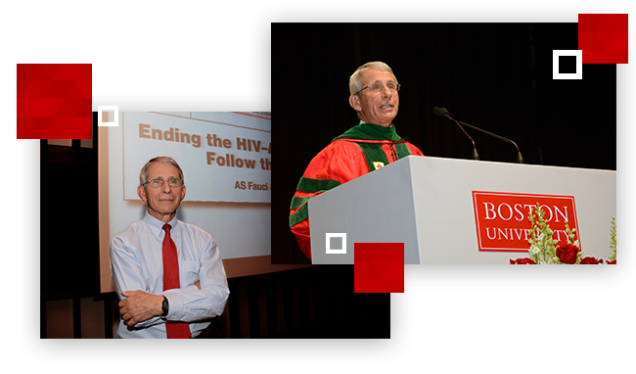NIAID Director Discusses Science Behind HIV/AIDS Treatment, Prevention

Anthony Fauci, MD, director of the National Institute of Allergy and Infectious Diseases (NIAID) at the National Institutes of Health (NIH), was a special guest on the Medical Campus on Thursday, May 18.
Selected as the commencement speaker for the MD & PhD convocation exercises, Fauci spent the day in Boston, beginning with a morning Grand Rounds on “Ending the HIV/AIDS Pandemnic” just hours before he delivered his address at Agganis Arena.
“The underlying theme is that we got to where we are by following the science and we will get to where we want to be by following the science,” Fauci said as he began his presentation. “I feel reasonably confident that we will see a durable end to the AIDS pandemic within a reasonable time.”
Appointed director in 1984 to oversee research aimed at preventing, diagnosing, and treating diseases such as HIV/AIDS, tuberculosis, Ebola and Zika, Fauci has advised five US Presidents and the US Department of Health and Human Services on global health issues.
According to Fauci, as of 2015 there were an estimated 36.7 million people living with HIV globally, with an estimated 2.1 million new HIV infections diagnosed in 2015. In the United States, an estimated 1.2 million people are living with HIV, 13 percent of whom do not know they are infected. In 2015, people 13-24 years old accounted for nearly a quarter of the HIV diagnoses.
Throughout his presentation, Fauci focused on the science behind HIV/AIDS and the antiretroviral therapy (ART) treatment protocol. ART drugs do not cure HIV/AIDS, but can prevent the growth of the virus. In the 1980s, before ART, the average life expectancy for a 20-year-old newly diagnosed with HIV was about 12 years. Today, with ART, the average life expectancy for the same patient is about 53 years.
“We now have about 35 antiretroviral drugs that, when given in a combination of three or four, has completely changed the lives of HIV individuals,” he said. “Today, if a person comes in who is 20-plus years old who is recently infected and I put him on a antiretroviral regiment, I can honestly look him or her in the eye and say that you will live an additional 50-plus years, which brings you almost to a normal life expectancy.”
Fauci also addressed options for prevention, such as STI treatment, HIV testing and counseling, blood supply screening, and education. He also discussed HIV PrEP: pre-exposure prophylaxis. HIV PrEP is the use of an antiretroviral medication by at-risk uninfected individuals to prevent the acquisition of HIV infection.
“The foundation for HIV treatment and prevention starts off with HIV testing, so everybody needs to be tested at least once,” he said. “If we want to talk about a perfect world, we are only halfway there.”
When analyzing treatment programs across the United State, Fauci highlighted the RAPID program in San Francisco, where professionals administer treatment drugs as soon as a patient tests positive for HIV. In Massachusetts, Fauci said that of the newly diagnosed cases, 79 percent of them are receiving care. A high percentage of those receiving care are retained in care and nearly 80 percent of those who are retained in care have successfully suppressed the virus.
“Even without a vaccine, we do now have the tools to end the HIV/AIDS epidemic,” he said.
After an early lunch with faculty, Fauci received a warm welcome from the Class of 2017 and their family and friends gathered at Agganis for the graduation ceremony.
“The evolution in Medicine and the Biological Sciences will be beyond your control, but you will be a part of it, hanging on seemingly for dear life to keep up with it,” Fauci said as he addressed the graduates. “Rest assured that being bored will not be a problem for you.”
Fauci reflected on his own graduation from medical school, and the feeling of anxiety he had looking forward to a medical career specializing in infectious diseases at a time when it was assumed the “war on infectious diseases” was essentially won. Just a few years later the HIV/AIDS outbreak occurred and the infectious diseases that followed – SARS, H1N1, Ebola, Zika – defined his career. While not every medical and scientific advancement in the future will be as dramatic, Fauci advised the students to be prepared for the unknown.
He also took a moment to address the importance of “global leadership in medicine.” In the 21st century, it is apparent we live in a global community and what happens in the United States has an impact on the rest of the world, he said.
“Your generation as a whole and some of you as individuals will be setting the example — and the world will look to you for leadership, be it in clinical medicine, teaching, research, administration or public health. Indeed, your generation of physicians and biomedical scientists will serve as the gold standard for the rest of the world.”
View all posts